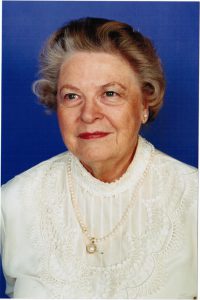WE ARE EMPOWERING INNOVATION
As change creators, the UW’s faculty, students and many partners make the Puget Sound one of the world’s thriving innovation ecosystems. By educating, transforming and inspiring creativity and entrepreneurship, our University embodies the grit, determination and inclusive approach to problem solving that is a hallmark the Pacific Northwest. The UW’s innovation mindset influences students and scholars across disciplines, turning ideas into impact.
More Green Than Grey
Doris Carnevali’s newest writing project didn’t start on the keyboard. Instead, it began with a rant.
A few years ago, Carnevali, an emerita faculty member and alumna of the UW School of Nursing BSN ’47, M.N. ’61, was hosting a lunch for colleagues from the school. At some point, Carnevali began to talk about the process of aging.
“I thought that aging had been given a raw deal,” says Carnevali, now 98. “It hadn’t proven stagnant and grey. It was constantly moving, challenging, making me feel the need to be green and growing.”

Lunch guest Azita Emami, Ph.D., MSN, RNT, R.N., FAAN, the Robert G. and Jean A. Reid Executive Dean of the UW School of Nursing, took it all in, then made a surprising suggestion: Perhaps Carnevali might consider sharing her insights online?
This conversation was the genesis of Carnevali’s Engaging With Aging blog. Every week, Carnevali sits down at her computer, draws on years of scholarship related to nursing and aging, considers her own experiences and current events, and writes. She discusses bath mitts and COVID-19, long-ago nursing practices and aging-related challenges.
She’s writing what she thinks fellow agers might be interested in considering — and aren’t getting from the culture.
“Maturational changes in children are highly valued by the child, adults and society,” says Carnevali. “Those of the aged are not, so there’s an incentive to ignore the age-related changes of the latter years as long as possible.”
In Engaging With Aging, Carnevali is making a case for her readers: That age-related changes are inevitable. That admitting changes and identifying strengths are part of purposeful living. That aging — and determining how best to use your time and intention — can be rich and meaningful.
Basia Belza, Ph.D., R.N., FAAN, director of the de Tornyay Center for Healthy Aging and the Aljoya Endowed Professor in Aging, thinks that Carnevali’s blog might hold a key to re-thinking the challenges of getting older.
“One of the most important concepts that Doris is presenting is that aging is not synonymous with pathology,” Belza says. “She’s making us wonder if the field needs a new developmental theory of aging.”
Belza and her colleagues, including Shaoqing Ge, Ph.D., MPH, are beginning to explore this idea with the help of a fellowship created by Jeffrey and Alicia Carnevali, Carnevali’s son and daughter-in-law.
Ge, the inaugural Doris Carnevali Engaging With Aging Post-doctoral Fellow, says her research team intends to recruit and study a cohort of 20 older adults of varying demographics and socioeconomic status. With the help of a grant from the de Tornyay Center, they’ll assess how participants address the challenges of aging. They’ll also determine if Carnevali’s ideas on engagement might prove helpful.
“The process of aging is a trajectory, not a single moment in time,” says Ge. “Engaging With Aging focuses on that trajectory, on the actual daily challenges of living that adults encounter as they age. We’d like to use Doris’s theory and ideas as a platform to help older adults create personal strategies that fit their individual needs.”
Based on the appreciative comments posted on her blog, Carnevali has already made inroads in helping fellow agers.
“You are helping to turn my ‘I’m getting old’ thinking into ‘I’m growing every day I’m alive’ thinking,” writes one reader. “The can-do attitude shines through,” writes another. “I’m trying to bottle it to help me follow this wise guide deeper into elderhood.”
Carnevali says the blog helps her, too.
“It keeps me engaged, looking forward as well as looking back, and it’s led to contacts with others —virtually, for the most part — that are enlivening and offer me new ideas and friendships I would not otherwise have had,” she says.
“There’s still gold in this river of aging,” says Carnevali. “And I’m finding it.”